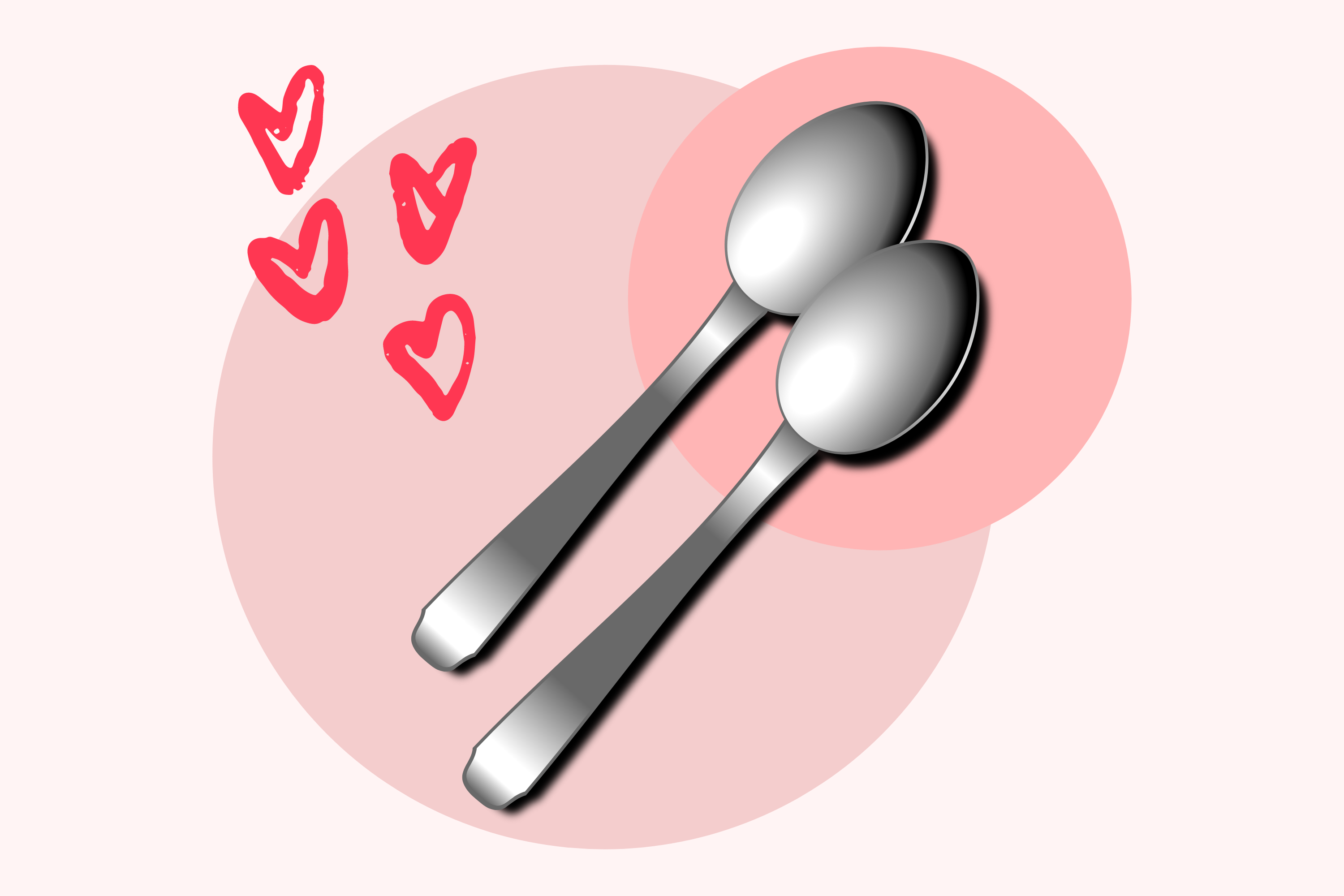What is spooning? Meaning, benefits and how it could improve your relationship
'What is spooning' is a question frequently asked, but where did it all start?! It's time to talk about the art of spooning...


If you sleep beside your partner at night, you may already know what spooning is without realising that's what it's called.
Well before it made its name as a must-have in the tantric sex manual, spooning was an essential way of sleeping with someone you trusted. It's so innate that the first evidence of human beings sleeping in the spooning position came from before the dark ages (literally). Cavemen used to sleep together naked in the spooning position as a vital way of keeping warm in the winter and offering each other protection against potential predators.
Now we don't need to sleep next to our partners for survival, your sleeping position says a lot about your relationship. Those who opt for the spoon don't only experience a closer bond with their partner - in and out of the bedroom - but they also receive more serious mental and physical health benefits (much like if they learn how to explain the mental load to their partner) than those who choose to sleep in separation.
What is spooning?
Spooning is a type of cuddle where two people lie facing the same direction. One person faces away while the other person lies behind, stomach to back.
The phrase 'spooning' was coined for this position as when done correctly, you tend to look like two spoons stacked sideways together in the cutlery drawer. The one being hugged from behind is called the "little spoon" while the other is the "big spoon". Traditionally, the taller person will be the big spoon and the smaller will be the little spoon for logistical reasons. When this is reverse, people affectionately call it "jetpacking" or "jetpack cuddling". This is because the smaller person looks a bit like a human jetpack on the other's back.

Many people taking the big spoon position wrap their arms around their partner. But the arms and legs can go anywhere it feels comfortable. Some people also like to intertwine their legs with their partner's, while others just keep them next to each other.
It's likely that anyone who loves a spoon will feel a whole lot better. Both in themselves and in their relationship.
Parenting advice, hot topics, best buys and family finance tips delivered straight to your inbox.
What are the benefits of spooning?
There are several huge physical and psychological benefits of spooning, according to research published in the Journal of Psychosomatic Medicine. Most importantly, spooning - and hugging more generally - leads to a release of oxytocin.
The study examined 38 couples who lived together, aged between 20 and 49 years old. All involved went through 10 minutes to resting alone. Then 10 minutes of "warm contact" - i.e. hugging - with their partner. After this, there was a further 10 minutes of post-contact rest by themselves. The researchers discovered a strong link between between the partner support and higher oxytocin levels. This was the same for both men and women in the study.
Also known as the "feel good" hormone, the rush of this hormone makes us feel very happy, comforted, supported and loved. But as well as having psychological benefits, it also has secondary physical impacts on the body that produces serious health benefits.
Research published in the Journal of Biological Psychology found that this higher level of oxytocin was linked to lower blood pressure and heart rate - especially in premenopausal women. The study examined 59 women before and after "warm contact with their husbands/partners ending with hugs". They discovered that those who had more frequent hugs with their partner had higher oxytocin levels. In addition to this, they found lower blood pressure and lower resting heart rate than others.

The release of this hormone has also been proven to reduce stress, ease pain and improve your immune system. According to a study from the Swedish University of Agricultural Sciences, department of Animal Physiology, this is because oxytocin reduces cortisol levels in the human body - the hormone that causes stress - and reduces blood pressure. The combination of these processes will also increase the body's pain thresholds, the study found.
For the same reason, spooning can also be a natural anxiety remedy. The combination of oxytocin-induced low cortisol levels and low blood pressure puts the body in a anxiolytic-like state. This "stimulates different variants of social interaction", easing anxiety in those who are chronically prone to the condition. This, in turn, helps those who struggle with anxiety-based insomnia get into a stage of sleep known as deep sleep, which is essential for all the body's processes.
And even better, people who repeatedly had high levels of oxytocin experienced these physical and psychological benefits in the long-term too.
In addition to this, oxytocin promotes growth and wound healing. This is because it plays a major role in the process of angiogenesis. Research from Università degli Studi di Milano in 2009 shows that injuries take more time to repair themselves when people are under stress or experiencing emotional turmoil. Both of these situations have links with lower oxytocin levels. One particular study looked at couples and found that the physical wounds of those who had intense conflict behaviour in their relationship healed a huge 40% slower than the wounds of those who were in relationships without conflict.
But how much spooning do you need to do for these incredible effects? Most of the studies we looked at discovered that around 10 minutes was enough to produce good oxytocin levels. However, as family therapist Virginia Satir once famously told Forbes magazine, "We need four hugs a day for survival. We need 8 hugs a day for maintenance. We need 12 hugs a day for growth. While that may sound like a lot of hugs, it seems that many hugs are better than not enough."

How can spooning improve your relationship?
The main reason spooning can improve your relationship is by "creating intimacy between you both without it having to be sexual", says relationship and narcissistic abuse expert, Emma Davey, from MyTraumaTherapy.
"It makes you feel loved, wanted and cared for which everyone in a relationship wants to feel. Feeling all these thing makes you want to be closer and more trusting to your partner."
But it can also help to improve the sexual side of your relationship, if this is something you're struggling with, as a lack of intimacy is one reason why people go off sex altogether sometimes.
As Emma says, "The physical proximity of spooning brings you closer, both emotionally and physically. It’s a very private act where your partner can show you affection in a way that’s natural to them. For example, they may struggle to articulate their feelings for you or hold your hand in public. But in private, when it’s just the two of you, they can show they care strongly and deeply about you. They’re trying to keep you safe and comfort you in the night."
She adds, "Remember, a hug can be a thousand words. If you’re feeling low within yourself, just having your partner there and holding you can be enough to make you feel safe, loved and supported."
Spooning and sex
Spooning is one of the best sex positions for conception so when most people think of spooning, their next thought is likely to be sex. The two have gone hand-in-hand (probably) since the cuddling position was first discovered all those thousands of years ago.
How it works: Both partners lie on their side in the spooning position. The little spoon lifts their leg and the big spoon enters from behind. While the big spoon is in control of the motion, it should be a slow and gentle movement.
But as with all sex positions, it's easier to experiment with what feels good for you. Avoid trying to copy instructions, a photo or video exactly. Just try and figure out what works best for you and your partner.
Video of the Week

Grace Walsh is a health and wellbeing writer, working across the subjects of family, relationships, and LGBT topics, as well as sleep and mental health. A digital journalist with over six years experience as a writer and editor for UK publications, Grace is currently Health Editor for womanandhome.com and has also worked with Cosmopolitan, Red, The i Paper, GoodtoKnow, and more. After graduating from the University of Warwick, she started her career writing about the complexities of sex and relationships, before combining personal hobbies with professional and writing about fitness.